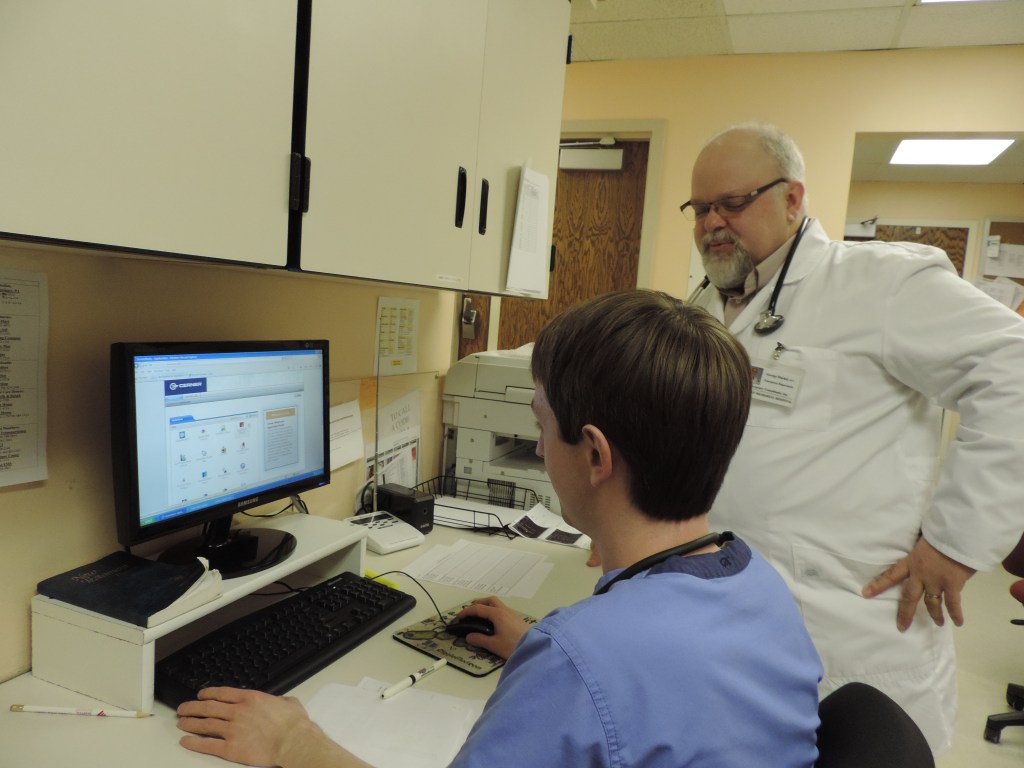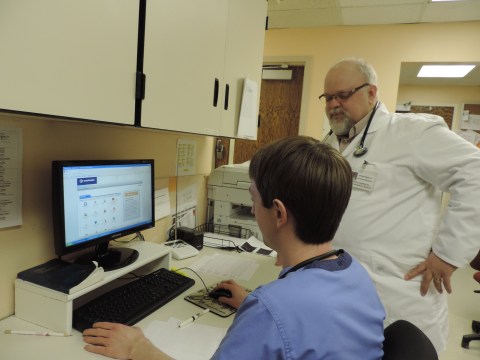Morgan Memorial Hospital in Madison got tired of having so many patients who were just passing through.
Too often in the past, the hospital has stabilized newly arrived patients, only to see them quickly bundled off to Athens for further treatment.
Ralph Castillo, the administrator for the 25-bed hospital in one of the most famously beautiful communities in Georgia, thinks he has the solution to this stopover problem. He has launched a program that he says will save lives and keep more patients in Morgan County, closer to home and family.
Castillo introduced a team of hospitalists – mainly physicians who specialize in the care of patients who are admitted to a hospital.
Morgan Memorial has brought in a hospitalist group of nine physicians and five nurse practitioners/physician assistants who manage and coordinate all aspects of a hospitalized patients stay while working closely with a patient’s primary care physician– from admission until discharge.
The idea, Castillo says, is to increase patient and physician satisfaction. Every day, a hospitalist comes in very early, catches up with the nursing staff on any overnight developments, and tends to about 10 patients in an eight-hour shift. That’s about 60 percent of Morgan Memorial’s inpatients on an average day.
Previously, all six of Madison’s primary care doctors came to the hospital to see patients who had been admitted. Castillo said having hospitalists at Morgan Memorial enables doctors in the community to see more patients in their offices, while inpatients have a hospital-based doctor to respond quickly and expedite their recovery.
A new idea for a small town
Most people around Madison don’t even know what a hospitalist is. But that’s probably true of most people around the country.
“Hospitalist” is a relatively new medical specialty, one rooted in a California experiment that began in 1992. The term “hospitalist” was coined four years later in a New England Journal of Medicine study.
Studies conducted in Minneapolis, Long Island, N.Y., Los Angeles and other urban areas indicate that hospitalist programs can decrease the average length of hospital stays by up to 35 percent. In Georgia, hospitalists have been around for a while in larger, regional hospitals.
But almost no data are available anywhere about hospitalist programs in small or rural facilities.
Because the service in Madison is only a few months old, its impact on patient care remains unclear. And there are skeptics. Not every local doctor has agreed to cooperate, and pharmacists are worried that working with hospitalists could make their job harder.
Morgan Memorial does not directly pay the salaries of hospitalists. They are part of an Integrated Care Program (ICP), a bundle of inpatient and emergency department services that cost the hospital $800,000 to $900,000 annually.
Since the hospitalists went to work at Morgan Memorial about four months ago, the average number of inpatients is higher by one to two per day.
“There were more patients leaving our ER room than they needed to,” Castillo said, “and having a hospitalist here enabled us to keep more patients here for the routine medicine rather than automatically shipping them to Athens.’’
Castillo said the hospitalist program also makes life better for primary care doctors in the community, giving them more free time. “I’ve got one physician in particular – he’s been able to travel outside the state of Georgia more often than he had in the past,” Castillo said, “and he’s also been able to actively participate in both of his children’s extracurricular activity.”
Benefits vs. drawbacks
Four of Madison’s six primary care doctors have agreed to hand off acute care patients to the new specialists at Morgan Memorial.
One is Dr. Dan Zant, a family practice physician who’s also chief of staff at the hospital.
“It helps me be free to tend to my patients in the office,’’ Zant says. “It’s helped me expand my hours to see more patients.’’ And after hours, he says, the hospitalist program allows him “to turn it off and enjoy some family time.’’
Dr. Miguel Cossio – known as “Dr. Mickey” to his patients – is one of two who have not. He says he feels strongly obligated to continue seeing his patients when they are hospitalized.
“It’s like you have a friend,” he said of the patient-doctor relationship. “When times are good, everyone’s your friend…but a true friend is there in the good times and the bad.”
Though Cossio says he has “no opinion one way or the other” about the hospitalist program, he made clear that has no intention of switching over to it.
Local pharmacist Elise Lang, who practices at Thrifty Mac, worries that the hospitalist program will make it harder for pharmacists to stay in the patient care loop.
The Affordable Care Act, she said, has already increased paperwork for folks in her profession, especially when ventilators or other medical equipment are needed. In such situations, pharmacists need more information from the treating physician.
But hospitalists, who see only inpatients, don’t necessarily have every patient’s complete medical records on hand when the pharmacist calls, Lang said.
And sometimes these physicians are harder to reach than office-based doctors. “They don’t keep regular business hours,” Lang said.
Other area pharmacists say they’ve faced the same issue when trying to fill orders for patients hospitalized at larger facilities with hospitalist practices, including Athens Regional Medical Center.
The full costs and benefits of Morgan Memorial’s hospitalist program remain to be seen. Most hospitals don’t see the positive effects until at least a year of services, experts say.
“At the end of the day,” said Castillo, “we want the patient well and on their way, just like the primary care physician wants the patient well and on their way.”
Lee Adcock is a first-year health and medical journalism student at the University of Georgia. She is also a music critic for various media outlets.



